湘少版六年级英语
湘少版(三起)英语六年级上册Unit1-Unit3期中复习课件

email world
Unit 3 习惯搭配/短 语
email my friends 给我的朋友们发电子邮件 send greetings 发送问候 search for a lot of things 搜索很多东西 find about countries 发现关于国家的情况 a wonderful day 美好的一天
复习Unit1-Unit3
湘少版 六年级上册
Unit1 What did you do during the holidays?
Unit 1 重点单词
during 在......期间 holiday 假期;假日 learn 学习 practise 练习 speak 说
Unit 1 习惯搭配/短语
6. He _te_a_c_h_e_s_ (teach) us English. 7. Tim _r_an__ (run) to the tree and climbed it. 8. I _v_is_i_te_d__ (visit) my grandparents last week. 9. My grandmother _is__m_a_k_in_g_ (make) some cakes for me. 10. Don’t _ta_l_k__ (talk) in the classroom.
What did he see yesterday?
4. never, he, birds, hurts (.) He never hurts birds.
5. walks, the, in, Betty, often, forest (.) Betty often walks in the forest.
an English storybook 一本英语故事书
新湘少版六年级上册英语教案

新湘少版六年级上册英语教案新湘少版六年级上册英语教案1教学目标:知识与能力:1、能听、说、读、写四个形容词的比较级形式heavier、stronger、bigger、thinner和smaller.2、能准确灵活地运用上述形容词比较级来描述人物和动物的特征差异。
3、能够完成match and say练习并能正确在其中运用。
4、能理解Story Time中故事。
过程与方法:学生能在小组合作中快乐学习英语情感与价值观:让学生了解重量计量单位,了解公斤和千克让学生能够养成合理饮食习惯,保持身体健康教学重点:掌握五个四会形容词的比较级形式。
教学难点:掌握以下形容词的比较级构词形式heavy---heavier, thin---thinner,big---biggersmall---smaller , strong---stronger.教具学具课件准备有关卡片,磁带等。
第几课时:3探索流程个性添加(教学反思)1、warm-up(热身)(1)日常口语练习(2)复习2、presentation(新课呈现)Let’s learn(1)教师拿出一双大人鞋子一双小孩的鞋子作比较,让一呈现单词bigger和smaller。
(板书bigger和smaller)让学生观察bigger不同。
(2)教师用PPT展示两张胖瘦人照片教授单词thinner和heavier(板书thinner和heavier),让学生观察heavier的不同。
(3)、出示健美教练的照片进而新授单词stronger。
(板书stronger)(4)、教师出示这几个单词卡,让学生比较它们的不同,词卡上又不颜色的笔书写比较级的变化。
(5)、放录音跟读单词。
(6)、学生和自己的同伴自己练习,根据他们的实际情况,并让特征明显的同学上台表演。
看谁做的又快又好。
practice(练习)Match and say教师先示范和一名同学,鼓励学生说出又创意的句子,如:Mike’s fish is bigger than mine.S1:sarah’s fish is(2)story time学生默读后回答,“Who is an excellent goalkeeper?” Why?让学生说出不理解的句子,一块讨论,扫清阅读障碍。
湘少版小学英语六年级复习知识点

湘少版小学英语六年级复习知识点文稿归稿存档编号:[KKUY-KKIO69-OTM243-OLUI129-G00I-FDQS58-湘少版(湖南少年儿童出版社出版)小学英语教材知识点,使用湘教版小学英语教材六年级(de)老师应该用得着,这些知识点还是很全面(de),希望对您有所帮助.1.字母:(大小)辨认、书写顺序;元音字母:A a , Ee, Ii, Oo, Uu2. 数字:1~999(de)基数词和序数词(de)运用,如计算、购物、时间、日期等.句型:①What's your number②What’s the time③How many pens are there④How old are you⑤How much is it⑥How tall are you⑦How heavy are you⑧What time do you get up⑨When's your birthday⑩What time did you see him3. 颜色:单词:red, pink, yellow, brown, blue, purple, orange, black, white, green.句型:①What colour is it②What’s your favourite colour4. 时间:年、季节、月、星期、日、时刻:Season( spring, summer, autumn, winter)Month: January, February, March, April, May, June, July, August, September, October, November, December.Week:Sunday, Monday, Tuesday, Wednesday, Thursday, Friday, Saturday.Day:1st May (the first of May), May 2nd ( May the second)句型:见话题2.5. 食品与饮料:人对食品与饮料(de)喜好;东西方食品.句型:①I like biscuits.②I’d like a cold drink.③Would you like some buns④Do you want some rice⑤This isn’t my food.6. 服装:服装(de)颜色:人对服装(de)喜好;某人(de)穿戴;所属关系;位置等.句型:①I like the green T-shirt.②Where’s my new cap③Who’s shirt is this④Is this your hat7.物品:名词(de)单、复数;特点、颜色、所属关系;存在(de)位置(in, on, under, beside, behind, in front of, above, near, inside, outside).玩具(toy car, doll, )文具(desk, book, bag ,pen, pencil, pencil-box, ruler, pencil sharpener,)句型:①What’s this②What colour is it③Whose is this④This is my brother’s painting.⑤I have a puppet.⑥There's a car near the hospital.⑦Was it in the wardrobe⑧Is there a book on the desk⑨That's not mine.8.动物和植物:cat, dog, duck, fish, sheep, bird, panda, monkey, rabbit, hen , cock, chick, tiger, lion, pig, cow , mouse (mice), elephant, ladybird, puppy, tree, flower, rose,9. 建筑与场所:factory, hospital, park, house, library, museum, office, farm, post office, bank, police station, railway station, bookstore, school, classroom, skating rink, café, house(ba throom, living-room, sitting-room, bedroom,kitchen),garden…10. 身体:head, hair, eye, nose, ear, mouth, neck, hand, finger, foot(feet) ,toe…外貌: fat, thin, tall, short, old, young, two big blue eyes, long hair, short hair, black hair. 句型:①This is my nose.②Touch your head.③Raise your arm.11. 个人情况:姓名、年龄、地址、特点与爱好.句型:①I'm twelve years old.②My hobby is reading.③I like music.④I'm interested in space.⑤My name is Peter.⑥I'm tall and thin.⑦Do you have any hobbies12. 家庭、亲属和朋友:姓名、年龄、地址、职业、特点与爱好、与你(de)关系family, grandfather(grandpa/granddad), grandmother(grandma/grand mum), father, mother, brother, sister, uncle, aunt, cousin, friend.句型:①Who's heHe's my father.②He's a doctor③He likes playing games.④My father helps me.⑤Is he a soldier⑥What’s he13. 学校:学校建筑和学校生活.school, classroom, library, playground, Chinese, maths , English, music, computer, PE, art, science,句型:①When do you go to school②What time do you have English14. 情绪和身体状态:happy, sad, tired, angry, shy, sorry, well, sick,句型:①I'm sick.②I'm happy.③We are sorry.④ I feel sad.15. 社交礼仪:礼貌用语;询问与应答.句型:问候①Hello./ Hi.②Good morning/afternoon/evening.③How are you ④How do you do⑤Glad to meet you./ Nice to meet you.介绍①My name is…②I’m a pupil.③I’m 12.④This is our teacher, Miss Chen.⑤He is from Japan.道别①Goodbye./Bye.②See you.③Good night.道谢①Thank you./Thanks.②You’re welcome.道歉①Sorry.②I’m sorry.③Excuse me.请求①Can I have a puppy ②Can I borrow a pencil ③Yes, please.④Of course.祝愿①Happy birthday.②Merry Christmas.提供帮助①Can I help you ②What can I do for you ③What’s the matter寻求帮助和建议①What can I do用餐①Do you want some soup ②Would you like some rice ③I'd like a cold drink.购物①Which one do you want ②Can I look at it ③I want a red one, please.④It's too expensive.⑤Have you got enough money⑥How much is it16.国家与国庆日:China, Japan, America (the USA), English( the UK), Australia, Russia, Canada, Singapore, India, France,句型:①When’s your country’s National Day②I come from China.17.天气与气候特征:hot, cold, cool, warm, sun, sunny, rain ,heavy rain, rainy, wind, strong wind,windy, snow , heavy snow, cloud, cloudy, …句型:①What's the weather like②It’s a cold day.③Spring is warm and nice.④Tomorrow will be rainy.⑤I like a sunny day.18. 节日:节日(de)特点;节日(de)活动.New Year's Day, Spring Festival, Children's Day, Mid-autumn Festival, Teachers' Day , National Day, Christmas Day, Dragon Boat Festival.19. 正在发生(de)事情:现在进行(de)动作和发生(de)事.句型:①Are you making a kite②Peter is writing.③What's Anne doing④Where are you going⑤What are they doing⑥Is he running20.日常生活:日常生活、工作、学习(de)活动.句型:①I come to school by bus.②Your homework is good.③What time do you get up④She always get up early.21. 计划与打算:计划和将要进行(de)动作be going to do …句型:①I’m/You’re /He’s/She’s /We’re/They’re (not) going to swim.②Are you going to swim③Is he/she going to visit Anne④What are you going to do⑤What is he going to do⑥When are they going to swim⑦Tomorrow will be rainy.⑧ I'll stay at home.22. 能力和可能:能做某事或可能进行某事.句型:①Can you read and write in English②Can I have a puppy③What can you do④She can run fast.23. 过去发生(de)事情或过去(de)打算:过去式.句型:①Where were you②Who was first③Was it in the wardrobe④Benny took my ball.⑤Where did you go⑥What did you do⑦I came by plane.⑧Anne wanted to skate.24. 对事物(de)比较:比较级和最高级.句型:①My singing is louder than yours.②I’m taller than you.③There more shops in Picture One.④Some stories are more interesting than others.⑤The most interesting stories.⑥Who is fatter25.提醒与告示:①What does that sign mean②Draw a cat on the roof.③Don't put your feet on the seat.④No speaking.⑤Do not go in.26.擅长和喜欢(de)事情:①I'm/ You're/ He's good at drawing.②I like playing basketball.。
湘少版六年级英语教案5篇
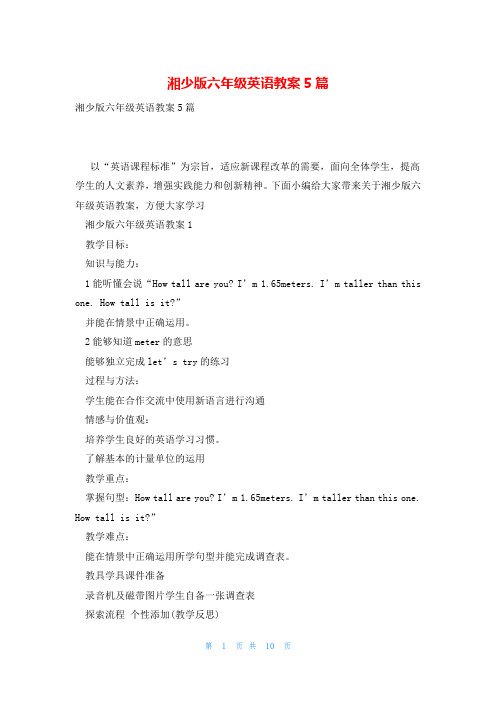
湘少版六年级英语教案5篇湘少版六年级英语教案5篇以“英语课程标准”为宗旨,适应新课程改革的需要,面向全体学生,提高学生的人文素养,增强实践能力和创新精神。
下面小编给大家带来关于湘少版六年级英语教案,方便大家学习湘少版六年级英语教案1教学目标:知识与能力:1能听懂会说“How tall are you? I’m 1.65meters. I’m taller than this one. How tall is it?”并能在情景中正确运用。
2能够知道meter的意思能够独立完成let’s try的练习过程与方法:学生能在合作交流中使用新语言进行沟通情感与价值观:培养学生良好的英语学习习惯。
了解基本的计量单位的运用教学重点:掌握句型:How tall are you? I’m 1.65meters. I’m taller than this one. How tall is it?”教学难点:能在情景中正确运用所学句型并能完成调查表。
教具学具课件准备录音机及磁带图片学生自备一张调查表探索流程个性添加(教学反思)1. preparation(预习)1.日常口语练习。
2.复习单词:taller longer older younger shorter2. presentation(新课呈现)(1)Let’s try教师播放录音,学生独立完成练习并核对答案(2)Let’s talka.生阅读对话,并解释大意b.教师范读,学生跟读c.分组读,个别读回答问题d.播放录音,学到再次跟读3.practice(练习)(1).T: How tall are you? I’m 1.65metres.引导学生回答,并多加练习。
(2).做完后教师出示图片问How tall are you?请学生轮流回答。
(3).把图片出示给学生,让他们加强练习。
同桌或小组之间互相练习。
(4).学生两人分角色朗读课文对话。
4.homework(家庭拓展)(1).做本单元A Let’s talk部分的活动手册配套练习。
湘少版六年级英语上册Unit5 I hurt my knee

2.任务4的教学:
(1)让学生仔细看Write, draw and talk的内容,先弄清题意和表格中所缺少的内容。
(2)让学生二人一组,讨论看到一个男孩或女孩受伤了应该怎么做。
(3)让学生在方框中填上相应的报警、火灾和医院救护电话,并牢记这些紧急求救电话号 码。在方框中相应位置分别画出自己的父亲和母亲头像,并在横线上正确写出父母亲的电话 号码。
(2)播放Listen and say的录音,先让学生仔细听,注意录音中的句型和表示身体部位的词语。
(3)根据Listen and say的内容,让学生两人一组,仿照对话范例,就图片中的人体各部位进行对话练习。 比如:
Pupil A: Help! Help me!
Pupil B: What's wrong with you?
(3)在学生基本听懂的基础上,进一步朗读短文的内容。朗读可以采用跟录 音读、教师带读、学生齐读,或分组轮流朗读等形式。
eye. 等句型。 3.培养学生对人身安全进行自我保护,避免意外伤害。 教学内容 词汇: safety first helmet near knife 句型: You should always/never ... Playing football is fun but you can get hurt. A pencil can hurt my eye.
(4)将学生分成两人一组,仿照表格下面的对话形式,设想遇到各种意外情况发生,自己 应该怎么办。这项活动,学生可自设情景进行对话练习(比如,遇到火灾,遇到有人受伤等, 自己该如何求救,应当及时拨打哪个电话)。
(5)教师播放自己制作的课件。课件中显示一个学生上学途中,突然从自行车上摔下来, 腿和胳膊受伤了。此时,正好有两个同学经过。于是,受伤的学生就向同学发出求救。听到 求救后,其他两个同学马上来到受伤同学身边,问清情况后,立即拨打了老师和家长的电话。 通过课件演示,进一步复习和巩固教学内容,也为学生处理意外事故做了示范。
新湘少版六年级上册英语教案
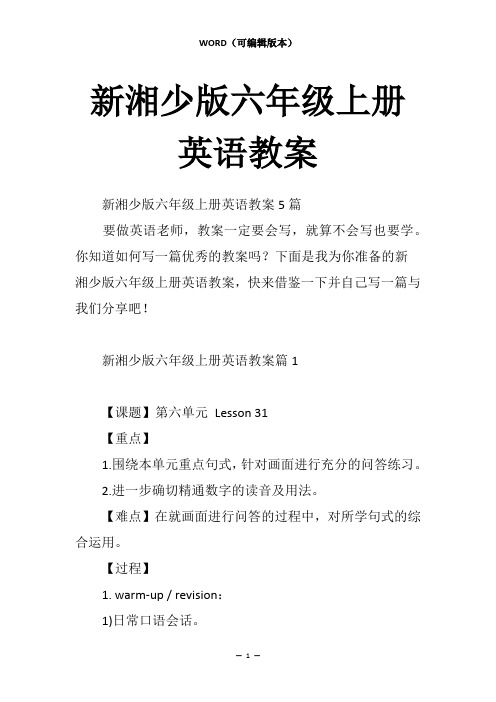
新湘少版六年级上册英语教案新湘少版六年级上册英语教案5篇要做英语老师,教案一定要会写,就算不会写也要学。
你知道如何写一篇优秀的教案吗?下面是我为你准备的新湘少版六年级上册英语教案,快来借鉴一下并自己写一篇与我们分享吧!新湘少版六年级上册英语教案篇1【课题】第六单元Lesson 31【重点】1.围绕本单元重点句式,针对画面进行充分的问答练习。
2.进一步确切精通数字的读音及用法。
【难点】在就画面进行问答的过程中,对所学句式的综合运用。
【过程】1. warm-up / revision:1)日常口语会话。
2)游戏:猜猜数字:一个学生心里想一个数字,其他学生猜测:学生问:Is it …?这个同学根据别的同学的猜测进行判断,并用UP / DOWN 来提示。
看谁能够最先猜出这个数字。
在学生游戏过程中,教师要注意引导,纠正学生不正确的发音。
3)读一读:教师出示单词卡片,学生齐读或个人读单词,教师纠正发音。
教师注意倾听学生-teen和-ty 的读音。
4)听一听:教师口述,学生写出听到的数字。
2. Learn to say:1)学生打开书看一分钟,注意观察画面。
2)合上书,回忆你在画面上看到了什么?What did you see in the picture? 锻炼学生记忆力。
3)四个人为一个小组,相互交流曾看到了什么。
Please talk about what you see in the pictures in you groups.4)学生叙述看到的.东西,教师播放与课文配套的影片。
教师根据学生叙述的进程,点击画面,出现一些实物场景或图片。
教师引导学生回答:How many … are there in the picture?Where are they?教师提问:What colour is it / are they?回答后,再播放一遍影片。
5)教师此时可以面向学习上有困难的学生提问,引导他们复习提问的方法。
湘少版六年级上册英语复习重点

湘少版六年级(Ji)上册英语复习重点Unit 1 What did you do during the holidays? 你在假(Jia)期都做些什么?●词(Ci)汇:holiday 假期 during 在(Zai)...期间 speak 说learn words and sentences 学习单词和句(Ju)子 play games 玩游戏learn writing 学习(Xi)写作 practise listening 练习听力●语(Yu)法:一(Yi)般过去时:表示过去某个时间里发生的动作或状态过去时判断标志:句子中有表示过去的时间。
yesterday昨天yesterday morning昨天早上the day before yesterda前天last night 昨晚last week上周last month上个月last year去年just now刚才two days ago两天前in 1990 等…..构成:主语+动词过去式动词过去式的变化规则:1.直接加ed:work—worked look—looked2.以不发音e结尾的单词,直接加d:live---lived hope---hoped use---used3.以辅音字母+y结尾的,变y为i加ed:study—studied carry—carried worry—worried4.以重读闭音节结尾且末尾只有一个辅音字母的,双写最后的辅音字母+ed:stop—stopped plan—planned;重读闭音节体现形式为辅-元-辅结构,例如nod,n为辅音,o为元音,d为辅音。
5.以ic结尾的动词,要把ic变成ick再加ed,如picnic→picnicked,traffic→trafficked6.不规则变化的动词过去式:have---had am/is---was are---were get---got say---said feel---felt do/does---did go---went drink---drank eat--ate bring----broughtthink----thought buy----bought catch----caught teach----taughtwear----wore cut----cut sweep----swept sleep—slept see----sawread----read sit----sat●语言结构:What did you do during the holidays?I read many books.I wrote a little storybook.◆乘坐某种交通工具“by+交通工具的名称” 如:乘火车by train 乘公共汽车by bus 但是,有一个特殊,步行on footUnit 2 Katie always gets up early.凯蒂总是很早起床。
小学英语-湘少版六年级上册全册课件

He always reads books.
She sometimes watches TV.
He often swims.
She never eats meat.
>> Presentation
Let’s Have Fun
>> Presentation
Let’s Have Fun
We had happy summer holidays. We enjoyed playing with our friends. We learnt from each other. We felt happy playing together.
>> Practice
Good to know
Summer holidays in foreign countries.
Summary
What did you do during the holidays? I ...
play games
learn writing
learn new words and sentences
>> Presentation
Let’s Read
× √ √ × √
>> Presentation
Let’s Read
A game —— Simon Says
>> Practice
活动1 Introduce a game in English
Silence man One student goes to the front, and says a word without any sound. The other students guess what the student said. The winner can go on this game.
湘少版英语六年级上册重点知识表 精选全文完整版

可编辑修改精选全文完整版湘少版英语六年级上册重点知识表Unit 1 What did you do during the holidays ?你在假期里做了什么?单词:during 在……期间 holiday 假日;假期 learn 学习practise 练习 speak 说短语:learn words and sentences 学习单词和句子play games 玩游戏 during the holidays 在假期里learn writing 学习写作 write a storybook 写一本故事书practise listening 练习听力 stand up 起立句型:——What did you do during the holidays?你在假期里做了什么? ——I read many books.我读了很多书。
I visited my grandparents.我去看望了我的爷爷奶奶。
I played games with my friends.我和朋友们一起玩了游戏。
补充:动词的过去式:talk-talked 谈论 practise-practised 练习 listen-listened 听 climb-climbed 爬 do-did 做 have-had 有 go-went 去learn-learnt 学习 take-took 拿 read-read 读 speak-spoke 说teach-taught 教 write-wrote 写 run-ran 跑Unit2 Katie always gets up early.凯蒂总是很早起床。
单词:always 总是 weekday 平日 often 常常;时常 after 在……之后 wave 挥手 return 返回 sometimes 有时 never 从不 短语:wave goodbye 挥手再见 take photos 拍照be late for school 上学迟到 draw pictures 画画do my/her/his homework 做作业 have breakfast 吃早餐read a newspaper 读报纸 after/before dinner 吃晚餐后/前 play chess 下棋 return home 回家take a walk 散步 help my parents 帮助父母 句型:Peter always get s up at 7:00 a.m.皮特总是早上七点起床。
湘少版六年级上册英语(7单元-8单元)

4)以“辅音字母+y”结尾的形容词或副词, 把y变为i,再加-er,-est heavy-heavier-heaviest, easy-easier-easiest early-earlier-earliest ●不规则变化的形容词: good(原形)-better(比较级)-best(最高级)
●句型:What can I do ? I can… +动词原型 我可以帮助老人过马路。 I can help old people on the road. 我可以帮妈妈做蛋糕。 I can help my mom (to) make cakes. help sb. (to) do sth.帮助某人做某事
●语法:should/shouldn’t do sth. 应该/不应该做某事
●语法:形容词的比较级和最高级 变化规则: 1)一般词尾加-er, -est small-smaller-smallest, tall-taller-tallest short-shorter-shortest, long-longer-longest 2)以字母e结尾的形容词或副词,直接加-r,-st nice-nicer-nicest, fine-finer-finest large-larger-largest 3)以重读闭音节结尾的形容词或副词,如末尾 只有一个辅音字母,双写该字母,再加-er,-est big-bigger-biggest, thin-thinner-thinnest hot-hotter-hottest fat-fatter-fattest
Unit7 What can I do? 我能做什么?
Unit8 We shouldn’t waste water. 我们不应该浪费水。
Unit7 What can I do? 迟缓的 虚弱的 一个老妇人 帮老人过马路 沏茶 做蛋糕 打扫房间 让他们开心 彼此 免费 女士(未婚) slow weak an old woman help old people on the road make tea make cakes clean their homes make them happy one another Free Ms
小学英语湘少版六年级上册《unit4It’stheMid-AutumnFestival》课件

Sing a Song
Do Re Mi.
New Words
Can you remember them? 你能记住吗?
New Lesson
Can you understy
Answer the questions. 回答问题。
Let's Practice
Unit 4
It’s the Mid-Autumn
Festival.
moon cake
Mid-Autumn Festival
中秋节简介
中秋节是我国的传统佳节,与春节、端午、清明并称为中国汉族的四大传 统节日。据史籍记载,古代帝王有春天祭日、秋天祭月的礼制节期为农历 即阴历八月十五,时日恰逢三秋之半,故名“中秋节”;又因这个节日在 秋季、八月,故又称“秋节”、“八月节”;又有祈求团圆的信仰和相关 节俗活动,故亦称“团圆节”、“女儿节”。
Role-play the story.
课文表演。
Read and Write
Read the text then answer the questions.读文章,回答问题.
thank you!
湘少版英语六年级上册 Unit 6
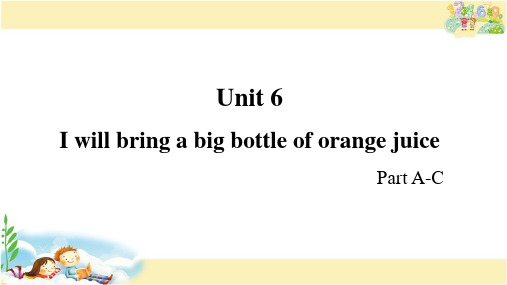
I will bring a big bottle of orange juice
Part A-C
Lead in
—If you go for a picnic, what will you bring? —I will bring ...
Autumn is coming. The weather is getting cool and nice.
bring
meet
peanut
fruit
candy
C Let's Practise
I will bring a
a bottle of orange juice. a few cans of Coke.
of Coke
three
of milk
bottle box can bar
C Let's Practise
Read and answer
1.Did they play beach volleyball together?
One sunny morning, Lingling, Dongdong, Peter and Anne went for a picnic at the beach. They played beach volleyball together.
Lingling’s father will ___b_ri_n_g_d_r_i_n_k_s ________________. Lingling’s mother ___w_i_ll__b_ri_n_g_b_o_o_k_s________________. Dongdong _____w__il_l _b_ri_n_g_b_e_a_c_h__b_al_l_a_n_d_C__o_k_e________. Lingling ____w_i_ll_b_r_i_n_g_c_a_k_e_s_a_n_d_b_i_s_c_u_it_s____________.
湘少版六年级上下册英语单词
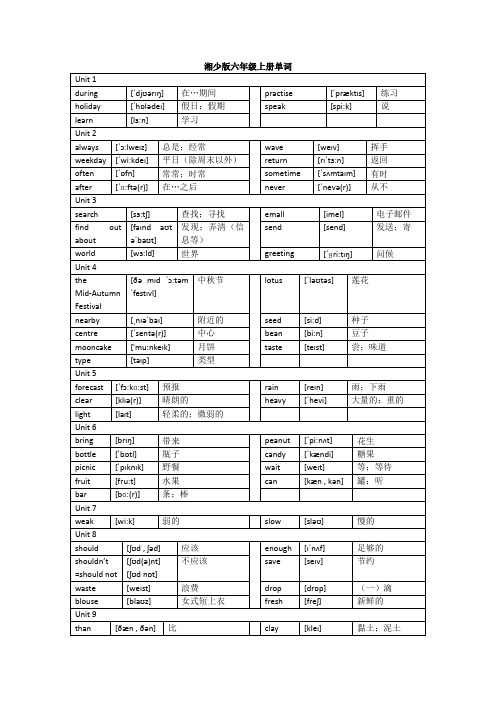
Unit 1
during
[ˈdjʊərɪŋ]
在…期间
practise
[ˈpræktɪs]
练习
holiday
[ˈhɒlədeɪ]
假日;假期
speak
[spiːk]
说
learn
[lɜːn]
学习
Unit 2
always
[ˈɔːlweɪz]
总是;经常
wave
[weɪv]
挥手
weekday
圣诞老人
colourful
[ˈkʌləfl]
彩色的
receive
[rɪˈsiːv]
收到
light
[laɪt]
灯
merry
[ˈmeri]
欢乐的
present
[ˈpreznt , prɪˈzent]
礼物
greet
[ɡriːt]
问候
湘少版六年级下册单词
Unit 1
together
[təˈɡeðə(r)]
在一起
[klɪə(r)]
晴朗的
heavy
[ˈhevi]
大量的;重的
light
[laɪt]
轻柔的;微弱的
Unit 6
bring
[brɪŋ]
带来
peanut
[ˈpiːnʌt]
花生
bottle
[ˈbɒtl]
瓶子
candy
[ˈkændi]
糖果
picnic
[ˈpɪknɪk]
野餐
wait
[weɪt]
等;等待
fruit
它的
lose
[luːz]
湘少版小学六年级上册英语全册教案
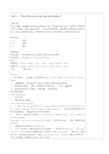
A, B 1课时
C, D 1课时
E, F 1课时
教学目标
语音功能能正确运用过去时描述人物已经做过的事情。
语言结构What did you do during the holidays?.
词汇
掌握词汇:during,holiday,learn,practise,speak,sentence,teach;
Step 3 Fast rห้องสมุดไป่ตู้ading and listening
1.出示课文中人物的图片。T: Look! What did Mingming/Anne do during the holidays? Think it over.
2.快速阅读课文A部分,回答问题。T: Today we’ll learn Unit One. First let’s listen to the text, and then answer my question:检查学生阅读情况,帮助学生回答所提问题。
3.听课文A部分录音,模仿其语音、语调,掌握新词难句的正确读音。
Step 4 Intensive reading
1.精读课文,然后两人一组完成课文E部分练习。
2.教师与学生校对答案后让学生按正确顺序读一遍。
3.听课文A部分录音,跟读。
Step 5 Consolidation
1.黑板上的单词卡片及图片复述课文。
2.可出示一张学生读书的图片。T: Look! What is Minging doing ? He is reading an English storybook.
Mingming: I read many books during the holidays.板书单词holiday,带读。复数形式是holidays。
湘少版英语六年级上册 Unit 4
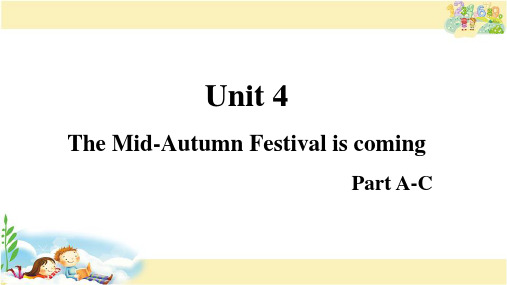
2.nearby 附近的 例句:He likes to take a walk in the nearby park.
3.centre 中心 短语:shopping centre 购物中心 例句:We are in the shopping centre.
4.type 类型 例句:Do you know these types of flowers?
I can see five people, a box and the moon.
Read and answer the questions.
1.Who gave Grandfather a gift? 2.When did Grandfather open the box? 3.How many boxes did he open? 4.How many mooncakes did they eat?
Let's cndfather a gift?
It was the Mid-Autumn Festival yesterday. My grandfather got a gift from his friend.
Let's check.
2.When did Grandfather open the box?
D Let's Read
It was the Mid-Autumn Festival yesterday. My grandfather got a gift from his friend. After dinner, he put the box on the table and said to us, “Let’s open the gift together.”
新湘少版六年级英语复习资料全

新湘少版六年级(上册)英语复习资料全(总7页)--本页仅作为文档封面,使用时请直接删除即可----内页可以根据需求调整合适字体及大小--新湘少版六年级上册英语复习资料Unit1 What did you do during the holidays假期你做什么了单词:learn words and sentences 学习单词和句子play games 玩游戏learn writing 学习写作practise listening 练习听力句型:what did you do during the holidays假期你做了什么I read many books.我看了许多书。
语法:动词过去式的变化规则一、规则动词的过去式变化规则①一般情况动词词尾直接加-ed。
如:work—worked play—played②以不发音的-e结尾的动词,动词词尾加-d。
如:live—lived taste—tasted③以辅音字母+y结尾的动词,把y变为i,再加-ed。
如:study—studied cry—cried④以一个辅音字母结尾的,重读闭音节动词(即Vivi常说的辅元辅结构)双写词尾辅音字母,再加-ed.如:stop—stopped clap—clapped二、不规则变化动词没有变化规律,需要童鞋们好好识记。
如:go—went make—madeget—got buy—boughtlearn—learnt do—didtake—took have—hadread—read speak—spoketeach—taught say—saidUnit2 Katie always gets up early凯蒂总是很早起床词汇:(频度副词:always总是、often常常、sometimes有时、never从不)get up 起床return home 回家take a walk 去散步do her homework 做她的家庭作业have breakfast/lunch/dinner吃早/ 中/ 晚餐play chess 下象棋wave goodbye 挥手再见read a newspaper 读报纸be late for school 上学迟到句型:Peter always gets up at 7:00 。
六年级上册英语书71到72,湘少版

六年级上册英语书71到72,湘少版摘要:一、引言二、六年级上册英语书71到72内容概述1.71课:问候与介绍2.72课:介绍家庭成员三、课程内容详细解析1.71课:问候与介绍1.1 重点词汇1.2 重点语法1.3 对话练习2.72课:介绍家庭成员2.1 重点词汇2.2 重点语法2.3 对话练习四、课程学习方法及建议1.培养良好的学习习惯2.多进行口语练习3.结合其他资源进行学习五、总结正文:英语作为我国义务教育阶段的一门重要学科,从小学阶段开始就需要打下坚实的基础。
今天我们将要解析的是六年级上册英语书71到72课的内容,这两课的主题分别为问候与介绍以及介绍家庭成员。
首先,我们来详细了解一下71课:问候与介绍。
在这一课中,学生们将学习到如何用英语进行日常的问候以及自我介绍。
例如,“Hello, I"m…”这个句型。
此外,本课还会涉及到一些表示问候的词汇,如“good morning”, “good afternoon”, “good evening”等。
通过学习这些内容,学生们能够更好地与他人进行英语交流,提高自己的英语沟通能力。
接下来是72课:介绍家庭成员。
在这一课中,学生们将学习如何用英语介绍家庭成员,包括父母、兄弟姐妹等。
例如,“This is my father.He is a teacher.”这个句型。
此外,本课还会涉及到一些表示家庭成员关系的词汇,如“brother”, “sister”, “grandparent”等。
通过学习这些内容,学生们能够更好地用英语描述自己的家庭,提高自己的英语表达能力。
在学习了这两课的内容之后,学生们应该掌握了一些基本的英语问候和介绍技巧。
为了更好地巩固这些知识,建议学生们在日常生活中多进行口语练习,培养良好的学习习惯。
同时,可以结合其他资源,如英语动画片、英语歌曲等,进一步提高自己的英语水平。
总之,六年级上册英语书71到72课的内容对于学生们来说是非常实用的。
新湘少版英语六年级上册unit7_

make tea I can make tea.`
make cakes
I can make cakes.
make them happy make them happy I can sing to them and make them happy. I can make them happy.
help old people on the road
I can help old people on the road.
clean their homes / houses I can clean their homes/houses.
make tea
make cakes sing
make them happy
湘教版小学六年级英语
Unit 7 What can I do?
By Miss Miao
an old woman
一位老太太
[meɪk]
make tea 沏茶
make cakes 做蛋糕
[keiks]
[ðɛə] [həums]
clean their homes
打扫他们的房间
[‘hæpi]
make them happy 使他们开心
help old people ['pipl] on the road [rəʊd]
扶老人过 马路
['kæ ri] [θɪŋz]
carry things
提东西
get on the bus
上车
get off the bus
下车
maings 提东西 get on the bus 上车 get off the bus 下车 an old woman 一位老太太 make them happy 使他们开心 clean their homes 打扫他们的房间 help old people on the road
- 1、下载文档前请自行甄别文档内容的完整性,平台不提供额外的编辑、内容补充、找答案等附加服务。
- 2、"仅部分预览"的文档,不可在线预览部分如存在完整性等问题,可反馈申请退款(可完整预览的文档不适用该条件!)。
- 3、如文档侵犯您的权益,请联系客服反馈,我们会尽快为您处理(人工客服工作时间:9:00-18:30)。
2、Let’s go to the library. I want to read science stories.
3、Let’s go to t4、 Oh dear! It’s four thirty. We can’t go anywhere now!
hungry
Do Re Mi.
哆来米.
Do Re Mi
doe a deer a female deer doe a deer a female deer
ray a drop of golden sun ray a drop of golden sun
me a name i call myself
me a name i call myself
far a long long way to run far a long long way to run
sew a needle pulling thread sew a needle pulling thread
la a note to follow sew
la a note to follow sew
tea a drink with jam and
tea a drink with jam and
bread
bread
that will bring us back to do that will bring us back to do
do-re-mi-fa-so-la-te do-so-do
hot
thirsty
sick bored
restaurant swimming
pool
cafe
hospital cinema
I’m hungry.
Let’s go to a restaurant.
hot
swimming pool
I’m hot .
Let’s go to the swimming pool
Unit 3
Let’s go to the Underwater World.
library [laibrəri]
picnic [piknik]
science [saiəns] story [stɔ:ri]
There was a public holiday last week. The weather was good that day. The children were talking about where they wanted to go.
Describe what each person is doing. 看图写句子。
Write sentences with “Let’s go ...”
Thank you!
thirsty
cafe
I’m thirsty. Let’s go to the café.
sick
hospital
I’m sick. Let’s go to the hospital.
bored cinema
I’m bored. Let’s go to the cinema.
Let’s see the Underwater World.
Can you remember them? 你能记住吗?
Can you understand it? 你能看懂吗?
Let’s go…
Let’s go to the underwater world to see the fish.
Let’s go to the zoo to see the tiger
